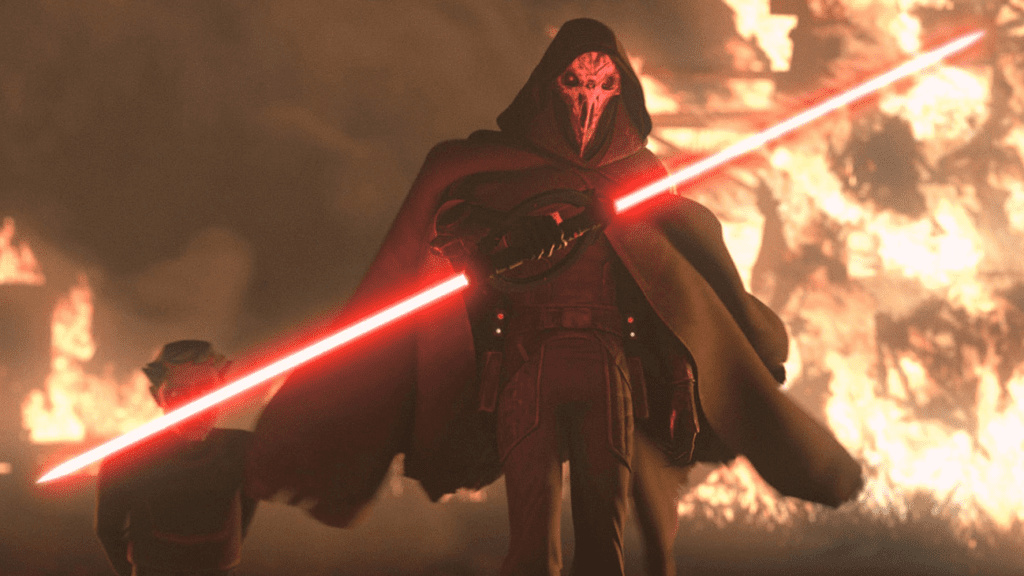Summary
Dave Filoni delivers more excellent Star Wars animation in this latest anthology, though its brevity and focus on familiar characters are obvious downsides.
This review of Tales of the Jedi season 1 is spoiler-free.
Star Wars has never had a particularly complicated sense of morality. The bad guys all wear black, blow up planets, and command soldiers called Stormtroopers, while the good guys are all meditative sage types or spunky well-meaning farm boys. In the early days, back when George Lucas’s galaxy far, far away was just a new setting for an old story along the lines of Joseph Campbell’s monomythic hero’s journey, Star Wars was imagined as a battle between good and evil.
But you can’t build a complex universe around that framework, so over time, and especially in spin-off series outside of the feature films, such as The Clone Wars, Star Wars began exploring murkier moral ideas. It became about the inflexibility of old ideas and systems, denial, the misuse of power, and how a changing world – or worlds, in this case – must necessarily result in adaptation. Everything terrible that has happened in this universe is easy to pin on old men in dark cloaks, but that’s only a fraction of the story. Even in space, the rise of totalitarianism doesn’t occur in a vacuum.
Tales of the Jedi season 1 review
Dave Filoni’s Tales of the Jedi fits right into this more complex model of moral responsibility, and in two batches of three episodes, each trio focusing on Ahsoka Tano and Count Dooku, respectively, it provides depth to a one-note villain and a beloved supporting character by unpacking the indecision and steadfast refusal to bend the rules that led to one Jedi falling to the Dark Side and another renouncing the Order altogether.
Ahsoka is an easy fit for the subject of her episodes, as an upcoming live-action series and a couple of appearances in The Mandalorian mean she’s at the forefront of the Star Wars collective consciousness. “Life and Death” explores her earliest year, long before we met her as Anakin Skywalker’s apprentice; “Practice Makes Perfect” uses her bond with Anakin to patch over the question of how Ahsoka was able to survive Order 66 when so many other Jedi didn’t; and “Resolve” works as, essentially, E. K. Johnston’s Ahsoka young-adult novel condensed into twenty essential minutes.
Ashley Eckstein and Matt Lanter reprise their beloved roles as the voices of Ahsoka and Anakin, and their relationship, at least for fans of The Clone Wars, is a familiar one. Returning to it is welcome, even if these episodes don’t yield as much depth as those focusing on Dooku.
“Justice”, “Choices”, and “The Sith Lord” work better as a trio since they have the unified goal of exploring exactly how Count Dooku – previously a rather thin villain designed, mainly, as someone Anakin could murder to set himself down a dark path – became thoroughly disillusioned with the Jedi Council and its unchanging fondness for rules and inaction. Corey Burton voices him with the same faintly smug and upper-class tone as the late, great Christopher Lee, but he provides some depth to the vocal performance that is enhanced by the animation and staging. But it’s the writing that really gets to the heart of the matter, with circumstances showing Senators benefitting from corruption at the expense of the people they represent, regular folks turning to extremism to have their voices heard, and Palpatine being able to consistently manipulate the Jedi through their blind adherence to the whims of the Senate.
Dooku is also the former master of Qui-Gon Jinn, who features in two of the three episodes, played as a youngster by Micheál Richardson and in his more recognizable Phantom Menace-era form by a returning Liam Neeson, whose inclusion was a big selling point of the anthology series, even if he gets little to do. This relationship, it turns out, is integral to Dooku’s fall.
Dooku’s episodes also fold in Mace Windu (TC Carson), essentially as a zealot who is utterly unquestioning of the Council’s every decision, and curiously Master Yaddle (Bryce Dallas Howard), who’s recognizable as a female Yoda with hair but comes into her own here as a complex figure who has stepped down from the Jedi Council thanks to many issues that mirror Dooku’s own but still subscribes to the essential tenets of the Order and the Light Side of the Force.
Both stories are strong. The only downsides to the anthology are its brevity – the six episodes all run under 20 minutes – and its focus on characters we have, admittedly, spent a lot of time with; Dooku less so than Ahsoka, but his appearances in The Clone Wars, the feature films, and Cavan Scott’s audiobook Dooku: Jedi Lost, have covered a lot of the same ground. Still, you can always rely on Filoni for some quality Star Wars animation, and that’s exactly what Tales of the Jedi provides.
Additional reading:



